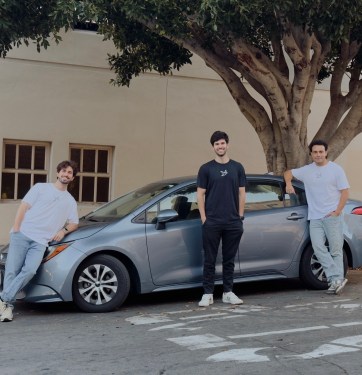Silicon Valley is known for comfortable offices with gleaming meeting rooms and on-site baristas. So when early HappyRobot engineer Ari Polakof decided to strike out and start his own company, he did not exactly expect to wind up tapping on his laptop in a service bay alongside mechanics. He described the environment as very noisy and impossible to concentrate. But that is part of the story of how Polakof’s new AI-for-car-dealerships startup, Flai, got off the ground last year.
Flai was founded by Polakof and his brother Alen, who also came from HappyRobot, during their time at Y Combinator. They were joined by former Netflix data scientist Juan Alzugary. Flai is one of a number of startups trying to use artificial intelligence to improve the experience of buying, selling, or servicing a car at a dealership.
The co-founders built software from the ground up that is specially tailored for the car dealership environment. It is omni-channel, meaning it can handle phone calls using voice agents as well as emails and texts using large language models.
Now Flai has closed a 4.5 million dollar seed round to try and scale up what they have built. The round was led by Liz Wessel at First Round Capital and included funding from YC, RedBlue Capital, Joe Montana’s Liquid 2 Ventures, and Innovation Endeavors.
Flai is not the only company doing this kind of work. Earlier this year, another Y Combinator-backed startup called Toma announced it had raised 17 million dollars from firms like a16z and car industry influencer Yossi Levi, known as Car Dealership Guy. A swarm of others are trying to build similar products, while legacy interactive voice response companies look to keep pace.
Polakof, who is CEO, said Flai’s offering is different because it is not using off-the-shelf voice tech. The startup built essentially everything from scratch, which has made its voice agents impressive enough that Polakof claims it has already convinced a few dealers to switch from other companies.
He also said there is a lot of room for competition in the market. There are thousands of car dealerships and service centers across the United States, and the majority have the same problem: they can lose potential customers if their phone lines are tied up.
After getting started last year, the Flai team realized the best way to train their AI and to start gaining customers was to start showing up at those dealerships. They tried cold calling, emailing, LinkedIn messaging, and attending conferences to network. But the bulk of the early work was done by going directly to the brick-and-mortar locations, visiting around 400 in those early days.
Once Flai struck up these initial relationships, Polakof said they essentially embedded with each dealer. That is how he found himself in a service bay last year, though he noted it more often meant setting up in an empty office. The Flai team spent every day, all day on the road during that initial period. He described it as very tiring and painful, but believes it was the only way and cannot imagine a bigger company doing it.
As the startup transitions out of that learning period and into one more focused on growing and making customers happy, Polakof said the small team is still pushing long hours, like so many of their peers in Silicon Valley.
The seed funding will help Flai grow, but Polakof said he does not expect the team to explode in size. He stated they want to work as smart as they can and do not want to have one or two hundred people working on this right now. Instead, the three-person team keeps each other accountable by focusing on tasks that are one hundred percent required; otherwise, it is not worth it.
In that sense, Polakof is not so far from those earliest days working in a service bay or dealership back office, just with less noise and fewer mechanics.

